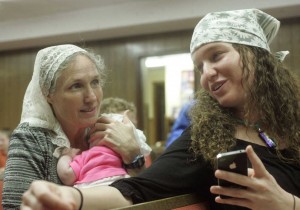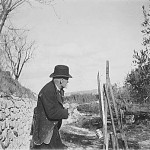Anyone familiar with the Westboro Baptist Church in Topeka, KS (and who isn’t?), knows that they are synonymous, in public perception, with their “God Hates Fags” protests. They are a

public nuisance, a blight on Christianity’s witness to society, and filled with hate. They are firmly entrenched in their insipid theology of hate and fear, and unflinching in their unworkable biblical literalism. They are a cult, pure and simple.
That’s why I was amazed to read, just today, the account of the recent defection of one of their leaders, Megan Phelps-Roper and her younger sister, Grace (both are granddaughters of Fred Phelps, the church’s founder).
Megan wrote a blog post, published yesterday, explaining her decision and the heart-wrenching process of leaving one’s family, support system, and ideology (ideologies are hard to leave, you know?).
She notes that the process of unplugging from her church began with an intellectual disconnect, a recognition of “anomalies” in the church’s theological system. The anomaly was pointed out in a conversation with an Israeli web developer, David Abitbol. Here is Megan’s explanation of the theological unraveling (from a fascinating article which describes her defection):
I would ask him questions about Judaism, and he would ask me questions about church doctrine. One day, he asked a specific question about one of our signs—‘Death Penalty for Fags’—and I was arguing for the church’s position, that it was a Levitical punishment and as completely appropriate now as it was then. He said, ‘But Jesus said’—and I thought it was funny he was quoting Jesus—‘Let he who is without sin cast the first stone.’ And then he connected it to another member of the church who had done something that, according to the Old Testament, was also punishable by death. I realized that if the death penalty was instituted for any sin, you completely cut off the opportunity to repent. And that’s what Jesus was talking about.
(Notice the delicious irony of a Jew pointing out that Jesus complicates a literalistic interpretation of the Old Testament)
Megan began to see disconnects all over. She even went to the public library, reading philosophy and religious books, and discovering that biblical interpretation and theology is complex and varied. How could her little church in the middle of Kansas have the corner on absolute truth about everything? She came to understand, as the article shows, that her church’s interpretation, “God’s feelings,” and the Bible are not necessarily “one and the same.”
What struck me from the article was her insistence that she really believed she was doing the right thing–she thought she was doing good, God’s work, by protesting and proclaiming hate.
I can’t help but think about Plato’s cave. She has turned from the shadows into the light. It’s a difficult journey out into the light. Especially when you’re traveling alone (or nearly so). But more than Plato, it reminds me of repentance in the Bible. Turning. A change of mind and heart. A new direction.
We all need to do this. To repent. Every day. And we need grace for that journey–no more or less than Megan and Grace.












